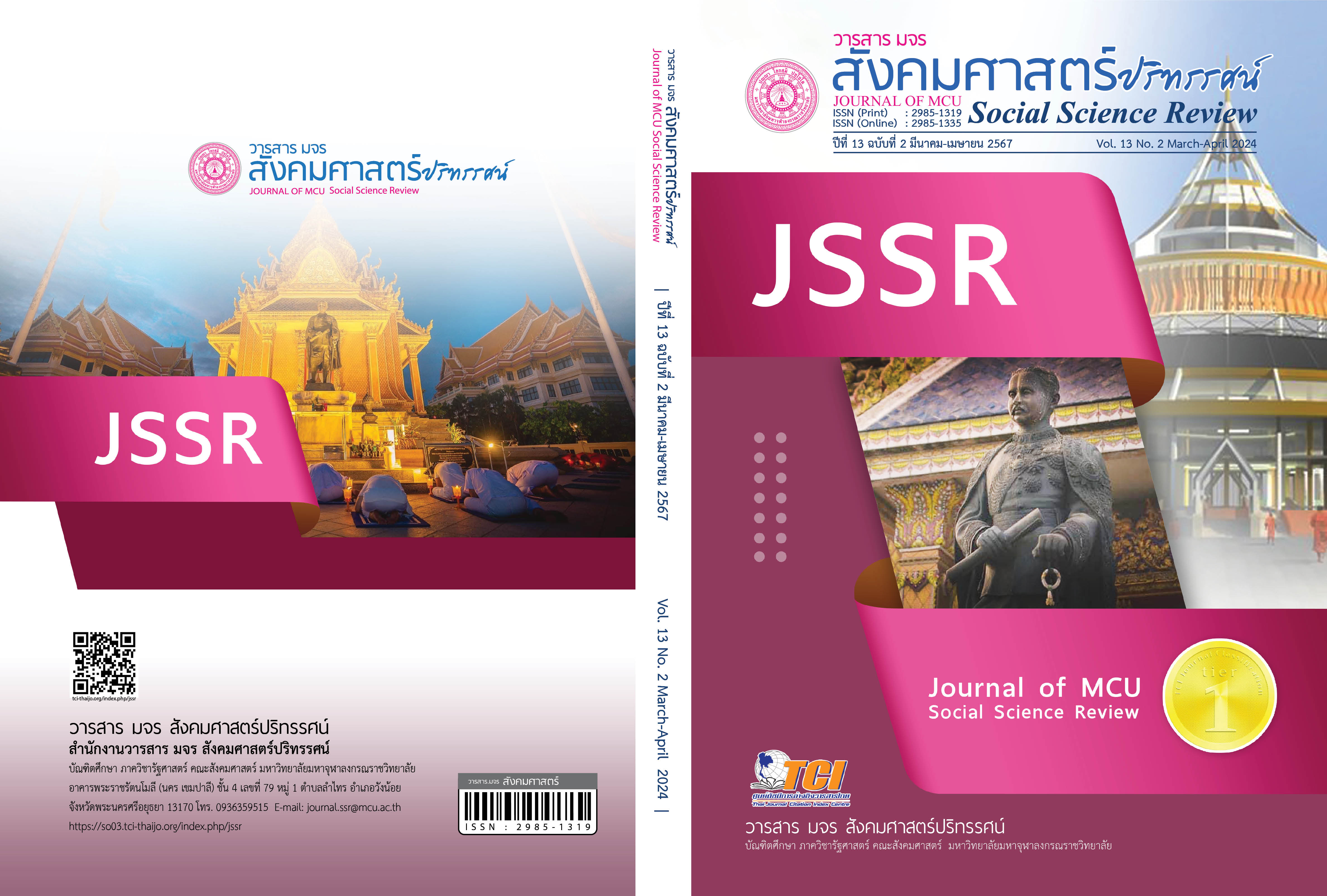ประสิทธิภาพการบริหารจัดการผลลัพธ์การเรียนรู้ตามกฎกระทรวง มาตรฐานคุณวุฒิระดับอุดมศึกษา พ.ศ. 2565
คำสำคัญ:
ประสิทธิภาพ, การบริหารจัดการ, ผลลัพธ์การเรียนรู้บทคัดย่อ
บทความวิชาการเรื่อง ประสิทธิภาพการบริหารจัดการผลลัพธ์การเรียนรู้ตามกฎกระทรวง มาตรฐานคุณวุฒิระดับอุดมศึกษา พ.ศ. 2565 ผลลัพธ์การเรียนรู้ เป็นผลที่เกิดขึ้นแก่ผู้เรียนผ่านกระบวนการเรียนรู้ที่ได้จากการศึกษา ฝึกอบรม หรือประสบการณ์ที่เกิดขึ้นจากการฝึกปฏิบัติ หรือการเรียนรู้จริงในที่ทำงาน ซึ่งเป็นผลลัพธ์ด้านการเรียนรู้ของผู้เรียน เช่น
1) ด้านการวิจัยและการสร้างนวัตกรรม ด้านการบริการวิชาการ ด้านศิลปะและวัฒนธรรม และผลลัพธ์ตามพันธกิจที่สถาบันอุดมศึกษาประกาศต่อสาธารณะ 2) ผลลัพธ์ด้านการทeประโยชน์ให้ท้องถิ่นและสังคม 3) ผลลัพธ์ด้านความพึงพอใจและความผูกพันของผู้เรียนและผู้มีส่วนได้เสีย 4) ผลลัพธ์ด้านบุคลากร ทั้งด้านอัตรากำลังและขีดความสามารถของบุคลากรด้านสภาพแวดล้อมการทำงาน ด้านความมั่นคงในอาชีพ ด้านสวัสดิการและผลประโยชน์ตอบแทน 5) ผลลัพธ์ด้านการนำองค์กร โดยมุ่งเพื่อพัฒนาผู้เรียนให้มีความรู้และประสบการณ์ที่สอดรับกับเกณฑ์มาตรฐานตามกฎทรวง อว. จากหลักสูตร (PLO) สู่การเรียนรู้รายวิชา (CLOs) ทั้งกรณีการบริหารจัดการหลักสูตรที่ยังใช้เกณฑ์ตามประกาศทรวง พ.ศ. 2558 และกรณีการบริหารจัดการหลักสูตรที่ใช้เกณฑ์ตามประกาศ อว. 2565 ต่างมุ่งพัฒนาผลลัพธ์การเรียนรู้
ให้ผู้เรียนหรือบัณฑิตสามารถอธิบายความรู้ที่รับได้และนำไปปฏิบัติได้อย่างเป็นรูปธรรมชัดเจน
เอกสารอ้างอิง
พระพรหมคุณาภรณ์ (ป.อ. ปยุตฺโต). (2545). พจนานุกรมพุทธศาสตร์ ฉบับประมวลธรรม (พิมพ์ครั้งที่ 10). กรุงเทพฯ: บริษัท อาร์เอสพริ้นติ้งแมสโปรดักส์ จำกัด.
มหาวิทยาลัยอุบลราชธานี. (2561). การพัฒนาผลลัพธ์การเรียนรู้ที่มีประสิทธิภาพและการประเมินผลสำหรับหลักสูตร. สืบค้น 8 กุมภาพันธ์ 2566, จาก https://shorturl.asia/EodCV
วิจารณ์ พานิช. (2556). งานสำคัญของการศึกษาไทยสร้างทักษะให้ผู้เรียนพร้อมศตวรรษที่ 21. กรุงเทพฯ: สำนักพิมพ์อักษรเจริญทัศน์.
สมชาย เทพแสง และคณะ. (2566). การศึกษาที่เน้นผลลัพธ์ Outcome-based Education (OBE): กุญแจสำคัญในการจัดการเรียนรู้ที่มุ่งเน้นนักเรียนเป็นหลัก. วารสารสหวิทยาการวิจัยและนวัตกรรมการศึกษา (Journal of Interdisciplinary Research and Educational Innovation), 2(1), 39-52.
สหธร เพชรวิโรจน์ชัย. (2564). PDCA: ความหมาย ประโยชน์ และตัวอย่างใช้ 4 ขั้นตอนเพื่อพัฒนาองค์กรอย่างต่อเนื่อง. สืบค้น 8 กุมภาพันธ์ 2566, จาก https://shorturl.asia/hK0Rc
อภินันท์ จันตะนี และคณะ. (2565). ระเบียบวิธีวิจัยทางการจัดการชั้นสูง. กรุงเทพฯ: บริษัท จรัญสนิทวงศ์การพิมพ์ จำกัด.
Phra Brahmagunabhorn (P. A. Payutto). (2009). Chronology of Buddhism in World Civilization. Bangkok: Phlithamm Publishing.
Raffinty, M. (2008). Time Management Skills. Bangkok: Exeter Network.
Roberts, M. (2006). Time Management. Bangkok: Thanapad Publishing.
ดาวน์โหลด
เผยแพร่แล้ว
รูปแบบการอ้างอิง
ฉบับ
ประเภทบทความ
สัญญาอนุญาต
ลิขสิทธิ์ (c) 2024 วารสาร มจร สังคมศาสตร์ปริทรรศน์

อนุญาตภายใต้เงื่อนไข Creative Commons Attribution-NonCommercial-NoDerivatives 4.0 International License.
เพื่อให้เป็นไปตามกฎหมายลิขสิทธิ์ ผู้นิพนธ์ทุกท่านต้องลงลายมือชื่อในแบบฟอร์มใบมอบลิขสิทธิ์บทความให้แก่วารสารฯ พร้อมกับบทความต้นฉบับที่ได้แก้ไขครั้งสุดท้าย นอกจากนี้ ผู้นิพนธ์ทุกท่านต้องยืนยันว่าบทความต้นฉบับที่ส่งมาตีพิมพ์นั้น ได้ส่งมาตีพิมพ์เฉพาะในวารสาร มจร สังคมศาสตร์ปริทรรศน์ เพียงแห่งเดียวเท่านั้น หากมีการใช้ภาพหรือตารางหรือเนื้อหาอื่นๆ ของผู้นิพนธ์อื่นที่ปรากฏในสิ่งตีพิมพ์อื่นมาแล้ว ผู้นิพนธ์ต้องขออนุญาตเจ้าของลิขสิทธิ์ก่อน พร้อมทั้งแสดงหนังสือที่ได้รับการยินยอมต่อบรรณาธิการ ก่อนที่บทความจะได้รับการตีพิมพ์ หากไม่เป็นไปตามข้อกำหนดเบื้องต้น ทางวารสารจะถอดบทความของท่านออกโดยไม่มีข้อยกเว้นใดๆ ทั้งสิ้น





